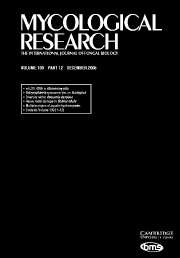Crossref Citations
This article has been cited by the following publications. This list is generated based on data provided by
Crossref.
Esslinger, Theodore L.
2004.
Recent Literature on Lichens—195*.
The Bryologist,
Vol. 107,
Issue. 4,
p.
566.
LINDBLOM, LOUISE
and
EKMAN, STEFAN
2006.
Genetic variation and population differentiation in the lichen‐forming ascomyceteXanthoria parietinaon the island Storfosna, central Norway.
Molecular Ecology,
Vol. 15,
Issue. 6,
p.
1545.
VONDRÁK, Jan
ŘÍHA, Pavel
ARUP, Ulf
and
SØCHTING, Ulrik
2009.
The taxonomy of theCaloplaca citrinagroup (Teloschistaceae) in the Black Sea region; with contributions to the cryptic species concept in lichenology.
The Lichenologist,
Vol. 41,
Issue. 6,
p.
571.
Divakar, Pradeep K.
Lumbsch, H. Thorsten
Ferencova, Zuzana
Del Prado, Ruth
and
Crespo, Ana
2010.
Remototrachyna, a newly recognized tropical lineage of lichens in the Hypotrachyna clade (Parmeliaceae, Ascomycota), originated in the Indian subcontinent.
American Journal of Botany,
Vol. 97,
Issue. 4,
p.
579.
FERNÁNDEZ‐MENDOZA, F.
DOMASCHKE, S.
GARCÍA, M. A.
JORDAN, P.
MARTÍN, M. P.
and
PRINTZEN, C.
2011.
Population structure of mycobionts and photobionts of the widespread lichen Cetraria aculeata.
Molecular Ecology,
Vol. 20,
Issue. 6,
p.
1208.
Ghobad-Nejhad, Masoomeh
Hallenberg, Nils
Hyvönen, Jaakko
and
Yurchenko, Eugene
2012.
The Caucasian corticioid fungi: level of endemism, similarity, and possible contribution to European fungal diversity.
Fungal Diversity,
Vol. 52,
Issue. 1,
p.
35.
Domaschke, Stephanie
Fernández-Mendoza, Fernando
A. García, Miguel
Martín, MaríaP.
and
Printzen, Christian
2012.
Low genetic diversity in Antarctic populations of the lichen-forming ascomyceteCetraria aculeataand its photobiont.
Polar Research,
Vol. 31,
Issue. 1,
p.
17353.
Werth, Silke
and
Scheidegger, Christoph
2012.
Congruent Genetic Structure in the Lichen-Forming Fungus Lobaria pulmonaria and Its Green-Algal Photobiont.
Molecular Plant-Microbe Interactions®,
Vol. 25,
Issue. 2,
p.
220.
Del-Prado, Ruth
Blanco, Oscar
Lumbsch, H. Thorsten
Divakar, Pradeep K.
Elix, John. A.
Molina, M. Carmen
and
Crespo, Ana
2013.
Molecular phylogeny and historical biogeography of the lichen‐forming fungal genus Flavoparmelia (Ascomycota: Parmeliaceae).
TAXON,
Vol. 62,
Issue. 5,
p.
928.
Altermann, Susanne
Leavitt, Steven D.
Goward, Trevor
Nelsen, Matthew P.
Lumbsch, H. Thorsten
and
Hajibabaei, Mehrdad
2014.
How Do You Solve a Problem like Letharia? A New Look at Cryptic Species in Lichen-Forming Fungi Using Bayesian Clustering and SNPs from Multilocus Sequence Data.
PLoS ONE,
Vol. 9,
Issue. 5,
p.
e97556.
Werth, Silke
Cheenacharoen, Saran
and
Scheidegger, Christoph
2014.
Propagule size is not a good predictor for regional population subdivision or fine-scale spatial structure in lichenized fungi.
Fungal Biology,
Vol. 118,
Issue. 2,
p.
126.
Núñez-Zapata, Jano
Cubas, Paloma
Hawksworth, David L.
Crespo, Ana
and
Nowrousian, Minou
2015.
Biogeography and Genetic Structure in Populations of a Widespread Lichen (Parmelina tiliacea, Parmeliaceae, Ascomycota).
PLOS ONE,
Vol. 10,
Issue. 5,
p.
e0126981.
Werth, Silke
Miao, Vivian P. W.
Jónsson, Zophonías O.
and
Andrésson, Ólafur S.
2015.
Recent Advances in Lichenology.
p.
61.
ALTERMANN, Susanne
LEAVITT, Steven D.
and
GOWARD, Trevor
2016.
Tidying up the genusLetharia: introducingL. lupinasp. nov. and a new circumscription forL. columbiana.
The Lichenologist,
Vol. 48,
Issue. 5,
p.
423.
Leavitt, Steven D.
and
Lumbsch, H. Thorsten
2016.
Environmental and Microbial Relationships.
p.
15.
Liu, Jinlong
Guo, Xianguang
Chen, Dali
Li, Jun
Yue, Bisong
and
Zeng, Xiaomao
2019.
Diversification and historical demography of the rapid racerunner (Eremias velox) in relation to geological history and Pleistocene climatic oscillations in arid Central Asia.
Molecular Phylogenetics and Evolution,
Vol. 130,
Issue. ,
p.
244.
Ament-Velásquez, Sandra Lorena
Tuovinen, Veera
Bergström, Linnea
Spribille, Toby
Vanderpool, Dan
Nascimbene, Juri
Yamamoto, Yoshikazu
Thor, Göran
and
Johannesson, Hanna
2021.
The Plot Thickens: Haploid and Triploid-Like Thalli, Hybridization, and Biased Mating Type Ratios in Letharia.
Frontiers in Fungal Biology,
Vol. 2,
Issue. ,


